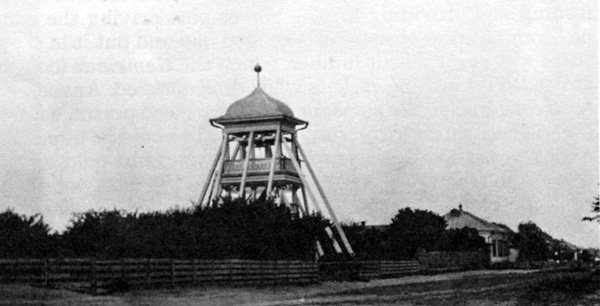The Freistehender Glockenstuhl (independent bell tower), standing proudly north of the wooden church in Norka, served as more than just a bell tower. It was the lifeline of the community, conveying messages, marking time, and summoning villagers to various events with its resonant tones.
Constructed adjacent to the wooden church, the bell tower was a necessity born from the church’s inability to support the weight of its bronze bells. Rising north of the church, it boasted a covered platform accessible by stairs. Three bells, each with its distinctive tone, hung above, activated by the steady pull of strings. The tower’s roof, adorned with a grand cross, mirrored the church’s spire, linking the two structures in purpose and symbolism.
Sunday mornings in Norka began with the melodious call of the bells, orchestrated by the hands of three men. Each bell toll signaled a stage of the morning service, guiding villagers from their homes to the church’s welcoming embrace. As the service concluded, the bells’ final peals signaled the return to daily routines, echoing through the village streets.
But the bells were more than mere timekeepers; they were the guardians of tradition and the bearers of news. From announcing the end of the workday to summoning villagers to prayer meetings, their resonant tones dictated the rhythm of life in Norka. Weddings, funerals, and other significant events were marked by the solemn tolling of the bells, drawing the community together in celebration or mourning.
In times of crisis, the bells became beacons of hope, their urgent peals rallying villagers to action. Whether warning of fires or guiding lost souls home during snowstorms, their voice was a source of comfort and reassurance.
Echoing through the annals of time, Pastor Eduard Seib’s recollections offered poignant insight into the profound significance of the bells in Volga German culture. He remarked, “Wherever one is, whether standing or walking, when a bell rings the person removes his hat or cap and prays a silent prayer.” For the denizens of Norka, the resonant call of the church bells was more than a mere summons to worship; it was a testament to resilience, community, and faith.
